|
Support Ghost Guns
|
Wes Stone: Historian's Actor
Contact him at http://wesstone.tripod.com/
Interviewed by Barbara Peterson. Uploaded November 5, 2006
Wes Stone was born on July 23, 1957 in Richmond, Virginia, at Stuart Circle Hospital, which was within sight of the J.E.B. Stuart statue. "It might have been prophetic!"
He started acting professionally at age 15, so his training came in high school, on the stage and at Lynchburg College in Virginia.
His first experience of "living history" was at Appomattox Courthouse National Historical Park when he was about ten. He loved it. "The 'Confederate Soldier' who spoke to us made the story as real as if I were there - I was certain he had been! Interestingly, I worked with this same man, Harold Howard, the last year he portrayed a soldier at Appomattox. I was the Union soldier. Later I took over the role of the local Southerner - only the second person to do so."
|
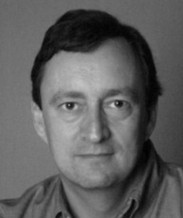 The real Wes Stone The real Wes Stone |
| Ghost Guns | Wes Stone |
| In 1979 you got your chance to try your hand at this sort of off-stage "historical acting" at the Richmond National Battlefield Park in Richmond, VA.
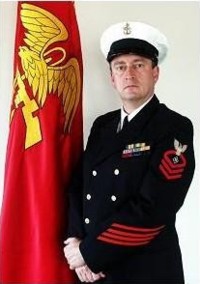
World War II Chief
© Edward Lanning
|
I had just been discharged from the U.S. Air Force and was working at a temporary job in the daytime and acting at night. I saw an ad in the Richmond paper for "Living History Interpreters" at Richmond National Battlefield. Intrigued with the idea, I called the number and spoke with Ranger Hyman Schwartzberg. I got an interview, went on to be one of several hired to work as Union "soldiers" in a full-scale army camp circa 1864. It was amazing!
We had all the material culture "stuff" to hand and were trained intensively for weeks before being allowed to interact with the visiting public. In camp - at work (though it was far from "work" for me) we followed the daily routine of a soldier in the Civil War, right down to the several hours of drill each day! (I can still do the Civil War Manual of Arms at the drop of a hat!) I credit Hyman with being the major influence on my working life. He set the standard and set it very high for all of us and then gave us the chance and the encouragement to succeed.
I've gone on to run my own interpretive programs and to do my one-man presentations, but the lessons I learned from Hyman Schwartzberg have been the bedrock and foundation for all that I've done since 1979. |

| You've depicted various characters from the past at dozens of sites including Plimoth Plantation, Jamestown Settlement, Appomattox Court House National Historic Park and the Calvert Marine Museum.
Do you portray the same character at each of these locations, or do you do different characters at different times for each one?
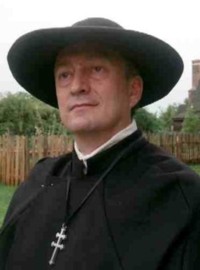
Father Andrew White
|
No, I have a collection of different characters.
As you might imagine, the basic body of knowledge for the parks and sites can be grouped - for instance, the experience of a Civil War soldier; the body of knowledge that makes him believable, serves for many different military characters of the period 1861-1865. Others are quite different.
I have portrayed George Washington's father, his uncle and the minister who baptized him, at various times and places, for instance!
Currently I try to limit myself to a few select characters - the Chesapeake Bay Lighthouse Keeper George Hart, Pilgrim Edward Winslow, Actor Edwin Booth, Jesuit priest Father Andrew White and architect Robert Mills to name the most requested.
However, if the right occasion comes along, I'm always looking for new ways to expose people to the story part of history. |

| Who has been your best audiences - at historic locations or in schools. In schools, what age level pays the best attention?
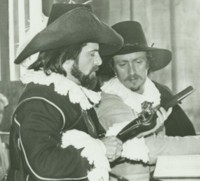
Pilgrim Edward Winslow, with Len Travers as Governor William Bradford
© Boston Globe
|
I much prefer historic sites - when a theatre can't be had!
People come to a site - and sometimes pay for the privilege - wanting to know more. Sadly, schools are often the least encouraging places for me to work. I'm also not really gearing myself to younger children.
Some - most - of the subjects I deal with are complex, as are the emotions and the feelings I try to portray. Small children don't have the background to understand some of that. There may, of course be exceptions (every teacher who is reading this has a class that is the exception!) Besides which...I'm sort of intimidated by small ones! |

| You served for a number of years as Curator of Education at Agecroft Hall in Richmond, VA - what education did you require?
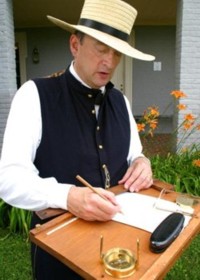
Confederate Engineer
|
My BA is in European History (though I went through several others before they'd had enough of me at Lynchburg College and threw me out!)
By the time I went to work for the Agecroft Association, I'd been in the field for over ten years and was fresh from a stint at Plimoth plantation in Plymouth, Massachusetts - at that time the premier "Living History" site in the country, and had been Curator of Interpretation at a county museum in southwest Virginia.
The job was created for me. It was a matter of being in the right place at the right time. |

| You were site manager of Bacon's Castle in Surry. What education did that require? Was it just a matter of 'time in grade,' or were there college/university courses you had to take?
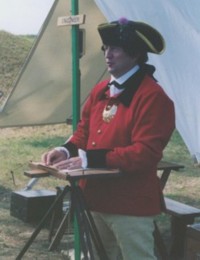
A Sutherland engineer
|
Time in grade? I like that. It sounds so very G.I.! But that is basically it. It was a matter of having the experience, training and background that the A.P.V.A. was looking for at that moment. Sadly, I am not cut out to be an administrator. When I found myself giving my job description as "thinking up fun things for other people to do" I knew I was in the wrong arena! |

| The lighthouse keeper, Edwin Booth, Robert Mills: Why did you choose each character that you portray?
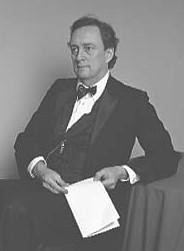
Stone as Booth
|
I choose characters who have a story to tell. It's really that simple. I can't force someone to be interesting. (I've tried... it doesn't work!)
I have to be interested in the character before I can make him interesting to others. In some cases a one-time character becomes a permanent part of my repertoire.
I also have to take into account where they might be useful. I would love to portray Roger Williams, the founder of Rhode Island, but it's not very marketable in the Mid-Atlantic.
On the other hand, the character of George Fox, the founding father of the Society of Friends, was created especially for the 350th anniversary of the county in which I live. The committee asked me to "do" someone and I'd always been interested in Fox and his travels in America... including landing right here where I live at present! He was a natural, and he has been in demand ever since. |

| Do you have any other show you're working on, or are these three enough?
|
Fox is continuing to find me work! I am ready to portray another of my heroes - Thomas Paine, the English revolutionary writer, but so far have had no offers. Anyone want to meet the hot-headed "Pen of the Revolution?" |

| When you attend National Parks in character (for example your recent presence at Yorktown National Battlefield), who chooses what character you portray, your schedule, lunch and dinner breaks, etc?
|
I choose the character - usually - unless it's already someone I portray that's been specifically asked for. I try to work with the site managers to get the best place for me and for them - I like to talk and don't enjoy being stuck away where I am not going to be seen! All of the clothing and "props" are mine - collected through the years (just like the 19th century actors used to do!) As far as getting lunch and dinner...I need you as my agent. I didn't know I got lunch and dinner! Seriously, my services are contracted for differently in each situation - sometimes it is for a short program - more performance oriented, and sometimes it is for most of the day either at a station or at certain times of the day. I love what I do... sometimes it is hard to get me to leave. |

| For your "Showing a light" program: Please give the background on its creation.
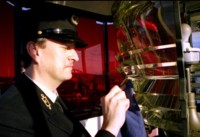
Lighthouse keeper
|
I like lighthouses. Lighthouses are inherently - and mythologically - romantic. But I have to confess, it was when I saw another person portraying a lighthouse keeper (and knew how much they were being paid) that I said the fateful words... "I could do better than that!" The response from the museum people was, "O.K.!" So here I am, nearly thirteen years later...still keeping lighthouses!
I had the extreme pleasure and privilege of meeting a man whose father and grand-father were keepers and who had, himself been born in the keepers house at Piney Point, Maryland. Harry Yeatman made me a lighthouse enthusiast. Sadly gone now, Harry is always with me when I work in a light. He and his family helped me learn a lot about the minutiae, the daily grind, if you like, of working a light station. They furthered my research tremendously. The rest - as for all my characters - [research] I do on my own. it's part of the process... the same as portraying a character on stage, really. |

| For your "Edwin - the Other Booth" program: Please give the background on its creation. Did you track down the various interpretations of Edwin Booth in the classic TV shows of the 1950s/1960s?
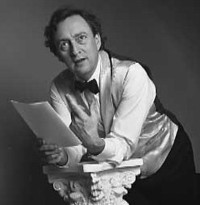
Edwin Booth
|
I'm glad you mentioned the old TV shows! People have forgotten them. But yes, I was always thinking of what a lonely, romantic character he was, even back then, and his identity was usually kept secret until the end of the show! Cool!
For Mr. Booth, I read everything in print and some out-of. Then I went back to the recollections published about him by his colleagues and friends. Remember, he was the most famous and successful actor of his generation. His portrayal of Hamlet is still legendary. (And is preserved on wax - Edwin Booth lived long enough to record two speeches for Mr. Edison!)
I'm fascinated by the change. He was revered as an actor in his own day - people not only forgave him his brother's horrible deeds, they forgot about them when they watched Edwin Booth. What a lesson in humility, isn't it? Little more than a century after his death, the only thing we remember about the most famous "star" in American theatre is his brother was a murderer. |

| For your "Robert Mills, Architect" program: Please give the background on its creation.
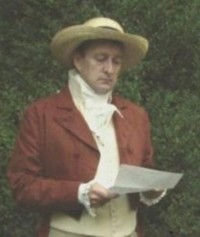
Robert Mills
|
I have always loved Mills and his work. I have visited many of his extant buildings and fallen in love with his graceful construction and design.
I was contracted by the Historic Richmond Foundation to portray Mills when they kicked off the renovation of his Monumental Church. It was not a hard study for me...I knew the buildings and the man; his home city of Charleston, S.C.... it was a matter of adding flesh to the bones. |

| Do you write scripts for each of these shows, complete with 'business' and 'blocking' or just do it all extemporaneously?
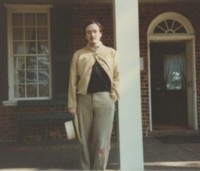
William T. Hubbard at
Appomattox Court House
|
Both. It depends on the requirements. I always know when I want to go and where we will end up - it's all scripted to that degree. Sometimes the path varies. I like it when other people think they are leading the conversation! And that is as it should be with those sorts of programs...it should be like a conversation with the character. Where else do you get to do that?
Booth tends to be more "scripted", but I have two versions of every character. I use the one most suitable to the audience, the venue and the occasion. |

| In getting ready for a performance at a school/museum - what do you have to do to prepare? Do you provide the school with press release material, or do they fashion that themselves. Do you investigate the location before hand? And so on.
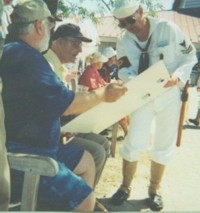
|
All of the above.
I can, and do, furnish advance materials - as much or as little as the client wants.
Preparations are always hard. My contract specifies as much as it can, but inevitably there are glitches. I HATE getting dressed in bathrooms. There is nothing worse than standing in one's underwear in a public restroom putting on makeup and having someone who is going to be in your audience walk in. So...no dressing in bathrooms...at least not that the public has access to!. |

| Any anecdotes you'd care to share?
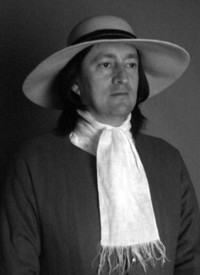
George Fox
|
Oh, in any profession one meets the people who know more about what one is talking about than he does. It's part of the game. I smile and nod with the best of them at times. One of my favorite lines came from a person who knew what he was talking about and how wrong I was. after all, he'd "read it in a book... and it was a big book!" (Thus I learned that the size of the source was directly linked to the veracity of its contents.)
Then there was the first time I portrayed George Fox, the "Quaker." Thankfully I didn't know till after the performance that half the audience was packed with members of the Society of Friends - all prepared to hate me! They didn't, and I have had a wonderful relationship with them ever since!
I portrayed Father Andrew White - the first Jesuit in English America - to a gathering here in Southern Maryland. When I came out I was met by a sea of black suits and Roman clerical collars...and the bishop, too! OH! A little nervous? Thankfully my Latin did not fail me...though it was a near-run thing!
Lastly, I suppose, is the story that keeps me working. I was much younger, working in character on one of the Jamestown ships. I'd finished a talk and was chatting with the visitors as they were leaving the vessel. One older man stopped and took my hand. He looked at me and said "Son, I just want to shake your hand. If somebody had taught me history like that I might have finished school." And then he left.
I think of him often...every time I work. |

| For someone who would like to get into this kind of business, have you any advice?
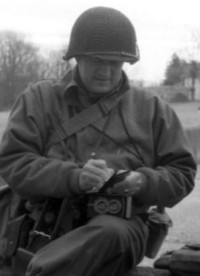
|
Don't...I don't need the competition! How about marry rich?
Seriously, it is not something to expect to do and pay all the bills every month.
Study everything. Remember your Acting 101 - it is all about The Method.
Read all you can, and study people - always study people. Their actions and mannerisms will serve you well.
Be faithful to your trusts. The people I portray were real. Don't make fun of them. Don't let yourself do things that your character would not have. Respect them... you have an obligation to "get it right." |
|
|



























